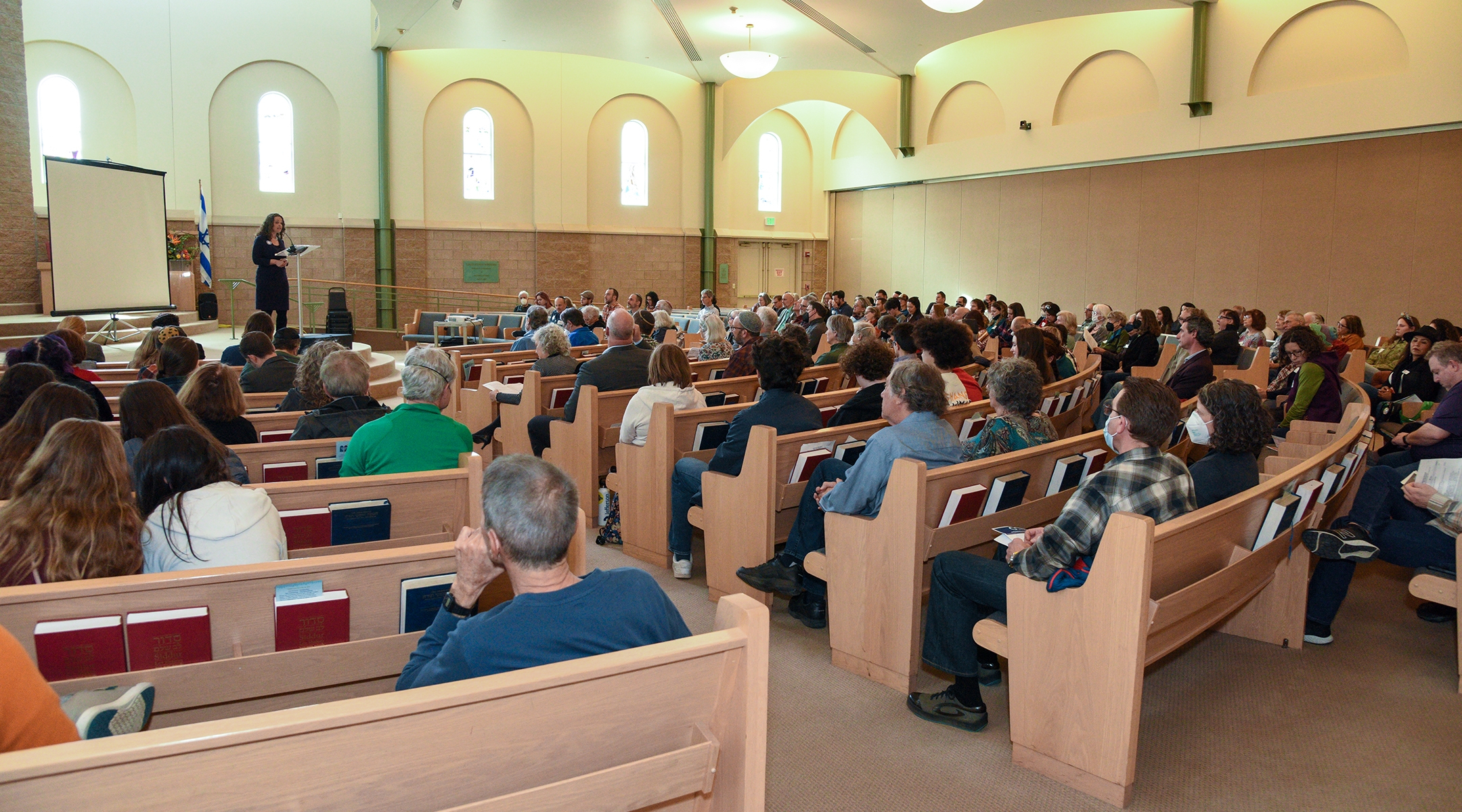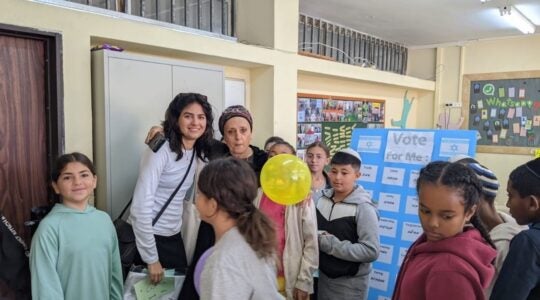This article was produced as part of JTA’s Teen Journalism Fellowship, a program that works with Jewish teens around the world to report on issues that affect their lives.
(JTA) — On an unusually warm February day, approximately 200 Jews gathered at the Hebrew Educational Alliance in Denver, Colorado for the inaugural Colorado Jewish Climate Summit, which coincided with Tu Bishvat, the new year of the trees.
Among the attendees were about 20 teens, who filed into the sanctuary, past tables stacked with brochures on sustainability and vibrant tapestries portraying Torah stories. They clustered into wooden pews, discussing the climate workshops they would attend — or lead.
“In the Jewish community, we talk about being collective in our efforts. And climate change is the same way — it’s not what one of us does, it’s what many of us do,” said Noah Shurz, a 16-year-old from Denver who helped plan the summit.
As the climate crisis and the global response to it intensifies, many Jewish teens are utilizing the intersections of Jewish and environmentalist teachings as impetus for activism. Through participating in groups like Jewish Youth Climate Movement, Dayenu and Jewish Climate Action Network, teens are strengthening their connection to Judaism and deepening their sense of community. Values like Tzedek Tzedek Tirdof (“justice, justice you shall pursue”), Tikkun Olam (“repairing the world”) and L’Dor V’Dor (“from generation to generation”) fuel their activism. These activists bring a unique perspective to the movement, combining the fervor of young changemakers with the tradition of the Jewish people.
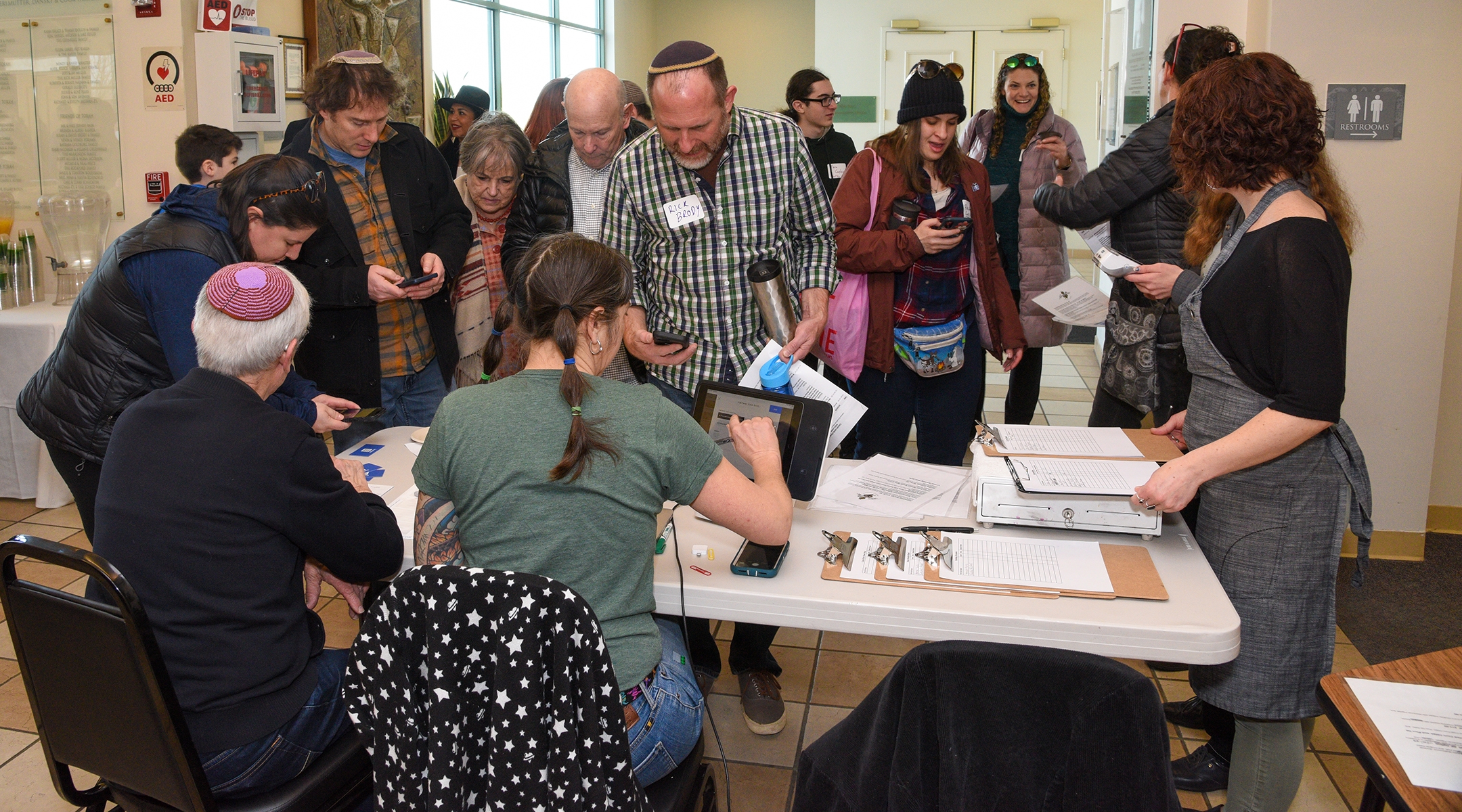
Event attendees sign up for lunch orders from the sustainable food trucks provided during the Colorado Jewish Climate Summit. (Courtesy of Colorado Jewish Climate Action).
“My Judaism and my desire to fight against climate change go hand in hand,” said Rivka Schafer, a Modern Orthodox 18-year-old from Teaneck, New Jersey who uses they/them pronouns. In their role as co-director for Jewish Youth Climate Movement, a youth organization founded in 2019 that has about 450 members, Schafer acts as the bridge between youth leaders and adult staff.
Schafer described participating in climate action as almost a religious obligation. “When I go into nature, I feel inherently connected to God,” said Schafer. “To see that loss of our natural world to me resembles a loss of spirituality as well.”
Schafer became a climate activist at age 12 after seeing bleached coral reefs firsthand during an underwater dive. “For the first time, it hit me, the destruction we are causing our world,” they said. “I decided that if the government wasn’t doing anything to fix the world, and if the adults weren’t doing enough, then it was up to me to bear that responsibility of healing our planet.”
Schafer’s co-director, Amber Marcus-Blank, 18, from Sharon, Massachusetts, shares this connection to the natural world. “There is a very similar feeling that I get when I’m reading Jewish prayers and when I’m in nature,” said Marcus-Blank.
In the past, Jewish Youth Climate Movement has pushed for banks to divest from fossil fuels, participated in and led climate protests and sent youth representatives to the U.N COP27 climate conference. More recently, as smoke from wildfires engulfed the eastern U.S, causing alarmingly poor air quality, JYCM teens connected the Biblical concept of neshama (both “breath” and “soul”) to the climate fight. The organization challenged their Instagram followers to “fight to protect the sanctity of our breath and the right for all communities to breathe safe and clean air,” suggesting actions like calling representatives to pass climate legislation like the NY HEAT Act.
The organization works with local Jewish institutions to create change within Jewish communities. Institutions “can look at implementing recycling/compost…can encourage transit usage by trying to get a bus stop next to them, or having bike parking and reducing car space: things to get people to see what they could also do in their household… and advocating for [climate action] bills,” said Shurz. JYCM teens lead sustainability trainings at Jewish institutions, build resources, run the social media accounts, and organize demonstrations; a few adult staff handle behind the scenes work.
Jewish activists use similar tactics to other groups — such as divestment campaigns or changes to unsustainable infrastructure — but their actions are by, about, and for Jews. Groups like JYCM make helping synagogues or day schools become more sustainable, a top priority.
For example, many synagogues, with assistance from Adamah (previously Hazon), are moving towards greener energy. The organization provides energy audits, educational resources, and institutional partnerships via their Jewish Climate Leadership Coalition (with more than 30 institutions across the country). Youth activists help educate Jewish communities as to the necessity of the program.
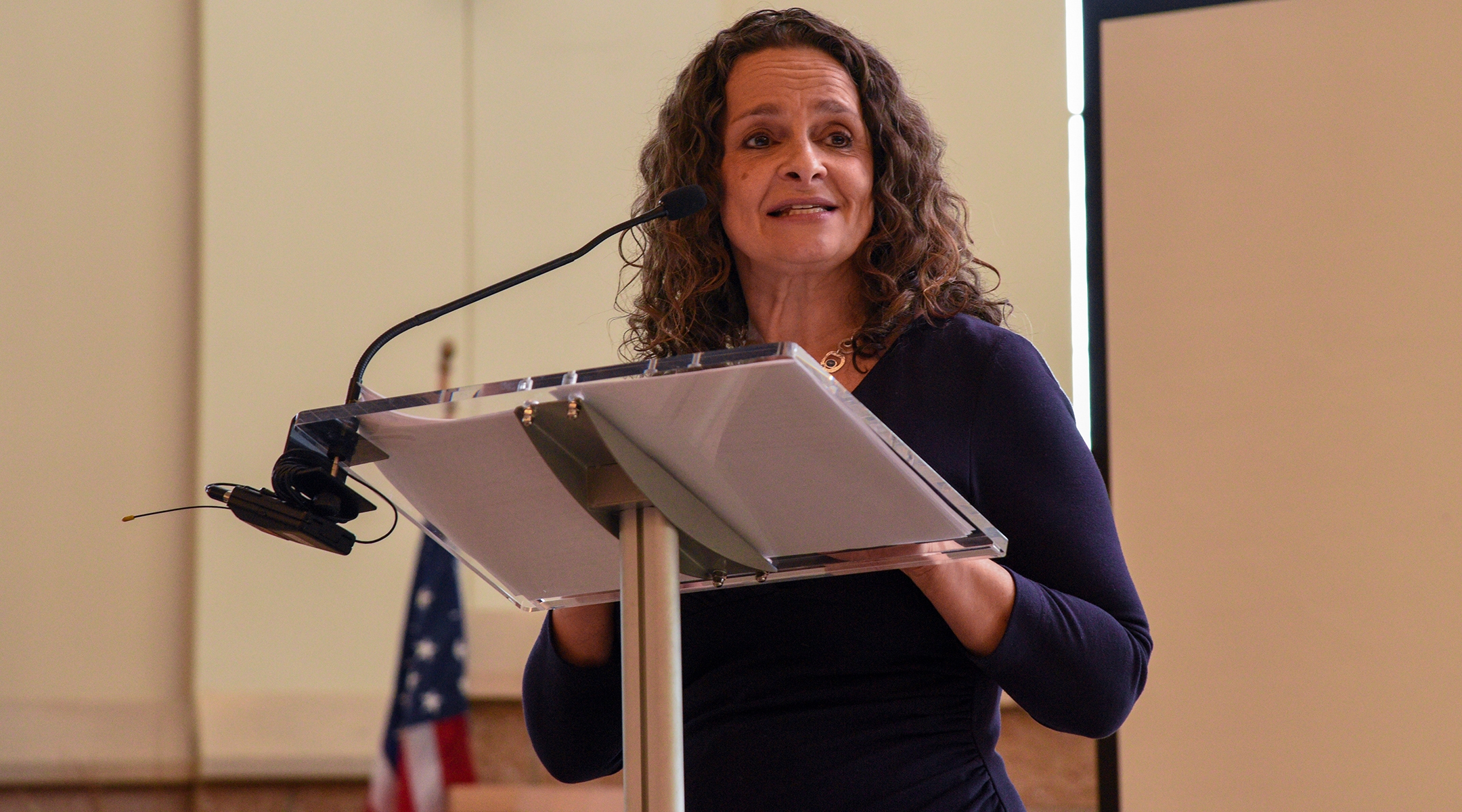
Rabbi Jennie Rosenn speaks at the Colorado Jewish Climate Summit about the importance, history and impact of Jewish climate action. (Courtesy of Colorado Jewish Climate Action)
Some teens interviewed say they were previously engaged in non-denominational climate action, but that Jewish activism serves their needs better. “As an Orthodox Jew, I keep Shabbos, I keep kosher,” said Schafer. “I wanted to be in a place where people would understand me and be respectful of my religious observances, so it just didn’t make sense for me to join [a climate] organization that wasn’t Jewish.”
Their co-director, Marcus-Blank, said that the intersectional nature of JYCM — Jewish, youth, climate — provides space for all her interests. “It allows me to be my full self in a way that I can’t really be in any other space.” She felt limited by other organizations: struggling with not discussing Judaism in secular climate spaces or climate in Jewish spaces, and sometimes, given her age, being ignored in both spaces.
“Being Jewish is what led me to [climate activism],” said Marcus-Blank. Being taught tikkun olam, surrounded by Jews who took action for the things they believed in, contributed to her desire to pursue environmental activism.
Not only can Jewish values like Tikkun Olam be connected to environmentalist principles, but many of those principles are explicitly found in Jewish teachings. Judaism regards human beings as the “guardians of the earth.” It dictates that God created the universe and it is the duty of humans to protect it (stewardship). Nature is woven into much of Judaism — from environmentally related holidays such as Sukkot or Tu Bishvat, to the Tree of Life, a metaphor for the Torah. Jewish tradition also supports modern sustainability concepts such as regenerative agriculture and low waste living.
Nevertheless, the Jewish presence in the climate movement is relatively recent. The first official Jewish-environmentalist organization, named Shomrei Adamah (for the Hebrew phrase “keepers of the earth”) was created in 1988 by Rabbi Ellen Bernstein. The organization’s mission was to “illuminate and make accessible the ecological roots of Jewish tradition and to inspire Jewish individuals and institutions to care for the earth and act on her behalf.” It has since been joined by other groups, such as Adamah (the parent organization of JYCM), which formed with the merger of Hazon and Pearlstone.
Recently, the field of faith-based activism has become more diverse, with interfaith organizations such as Greenfaith gaining prominence. Jewish climate activism also has been increasing as more Jews learn of the scale and speed of the threat.
Through JYCM, teens also learn more about Judaism. Marcus-Blank learned about nigun, a form of sung prayer, at a retreat with JYCM in 2022. During Dayenu’s 2022 “All Our Might”campaign, JYCM youth activist Lexie Miller brought matzah to the leader of a Wells Fargo bank as symbolism for the limited time remaining to fight the climate crisis – just as the Jews had limited time for the matzah to rise.
JYCM also conducts trainings relating Jewish persecution and perseverance to climate action. Miller, who serves on the JYCM national youth leadership board, helps to create ‘equity and inclusion’ resources explaining to youth that now is a time that Jews must fight for survival, just as in the past. “I perceive the threat of climate change very similar to how I felt people in the Torah must have felt when their homes were threatened,” said the 13-year-old from Boulder, Colorado. The concept of justice for Jews and other marginalized groups plays a large role in JYCM’s philosophy. “All of our Jewish teachings tell us to stand up for those who can’t stand up for themselves and to care for the world. That’s why climate activism and [equity and inclusion] is rooted so much in Jewish history,” said Miller.
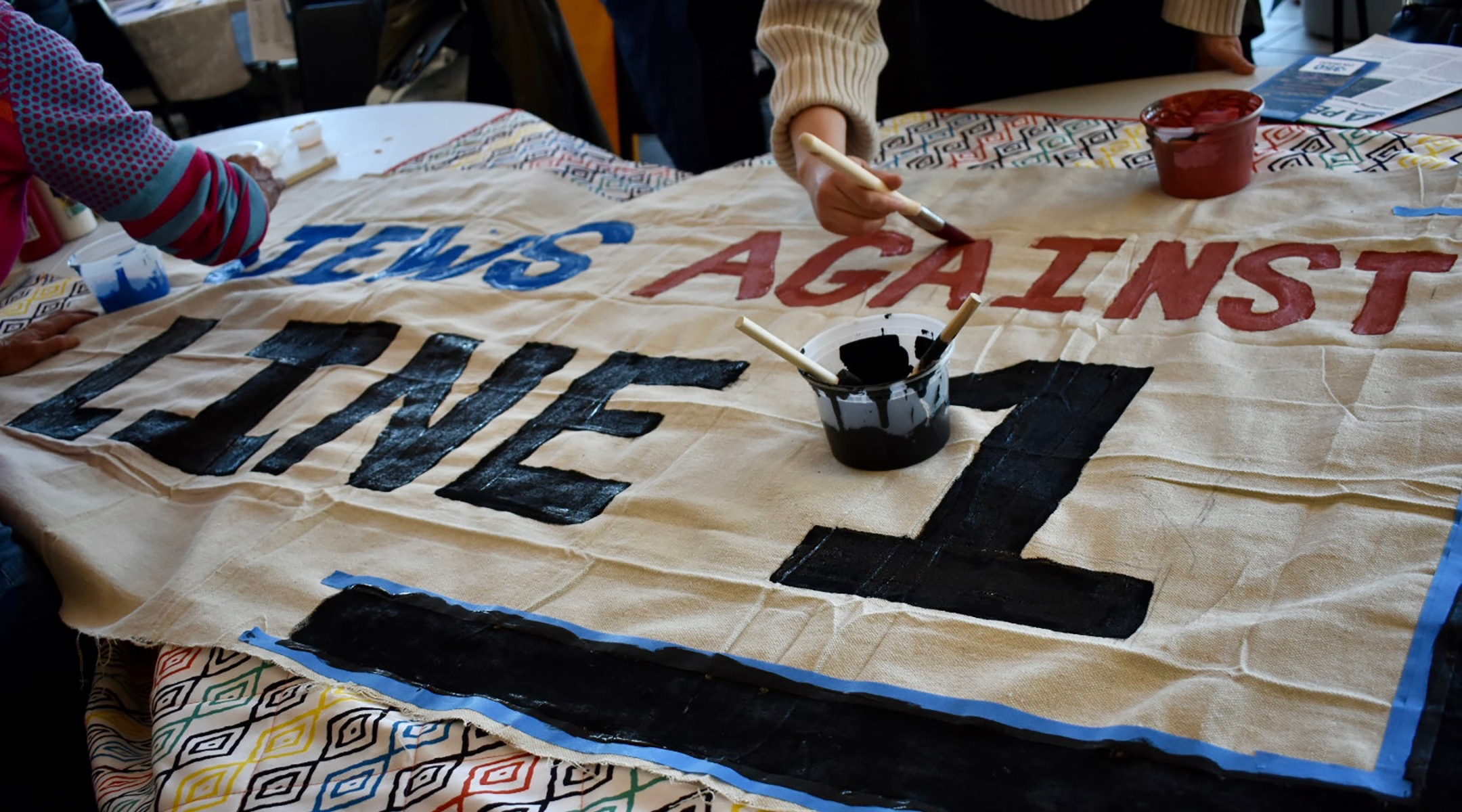
Attendees paint a protest banner during the Colorado Jewish Climate Summit. (Shira Nathan)
For the Colorado Jewish Climate summit, the teens planned with adult organizers for months. The event was similar to others that Jewish teens are coordinating across the country. The summit came to fruition under the direction of Colorado Jewish Climate Action, and included Rabbi Jennie Rosenn of Dayenu and a message from U.S senator Michael Bennet. Colorado Jewish Climate Action hopes to collaborate further with the youth activists; in the future, the Denver kvutzah will serve as a youth outreach partner.
Many teens choose Jewish-based climate action because it fosters community. “[The other teens] inherently understand some of the biggest components of my identity and the things I value,” said Schafer.
Taking action in these groups can also alleviate burnout, a common phenomenon experienced in climate activism. “In this line of work, where you’re facing an existential crisis, it’s not a tangible goal that you’re reaching for. And so it can be really easy to get burned out and be disappointed by the lack of action,” said Marcus-Blank. “JYCM is what kept me going, because these people have so much hope and optimism.”
These teens combine the ideals of youth and deep-seated values of Judaism as fuel for continued engagement in the climate movement; especially l’dor v’dor, “from generation to generation,” the value of preserving/protecting Jewish faith and livelihood in the face of adversity in order for future Jews to benefit,
“There’s a certain urgency that comes with young people, because we are starting to see the effects of climate change in real time. My Jewish values project that urgency because I’m really in tune to wanting to help people,” said Marcus-Blank. “And the persecution of Jews has always created changemakers. So both of those things go hand in hand.”
JTA has documented Jewish history in real-time for over a century. Keep our journalism strong by joining us in supporting independent, award-winning reporting.
